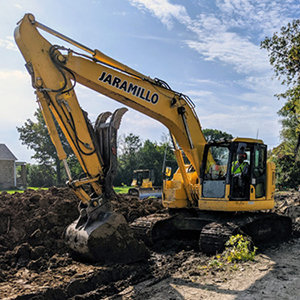Comprehensive Excavation Methods: Mastering the Basics for Success
In the world of construction and civil design, the significance of efficient excavation methods can not be overstated. The careful planning, precise implementation, and meticulous interest to detail needed in excavation projects demand a detailed approach that includes different essential facets. From preliminary soil analysis to the application of safety and security actions and regular progression tracking, understanding these core elements is necessary for accomplishing success in any kind of excavation venture. The true mastery lies not just in understanding these principles however in flawlessly integrating them to browse the intricacies of excavation tasks with finesse.
Recognizing Excavation Project Preparation

The first phase of any excavation project is the preparation stage, where important choices are made that can dramatically impact the result of the task. Recognizing the job timeline, range, and spending plan constraints is critical for developing a comprehensive excavation plan that ensures the job's success.
One trick element of excavation job planning is the advancement of a comprehensive timeline that describes the sequence of milestones, target dates, and activities. By very carefully considering all these variables throughout the planning phase, excavation tasks can be carried out efficiently and properly, leading to effective results - dump truck companies in ohio.
Dirt Analysis and Site Analysis
Conducting comprehensive dirt analysis and site assessment is a crucial action in the preparation phase of any excavation project. Soil evaluation involves figuring out the structure, framework, and residential properties of the dirt at the excavation website. This info is critical for recognizing the soil's bearing ability, wetness content, and possibility for erosion, which are essential consider identifying the excavation approaches and equipment needed for the task.
Site analysis surpasses dirt analysis and incorporates a more comprehensive evaluation of the overall website conditions. This analysis consists of recognizing any kind of possible dangers, such as below ground energies, environmental concerns, or unstable surface, that could influence the excavation process. By completely assessing the website, task supervisors can develop reliable excavation approaches that focus on safety, efficiency, and environmental defense.
Using sophisticated technologies like ground-penetrating radar, dirt tasting, and drone studies can enhance the accuracy and performance of soil evaluation and site analysis. Spending time and resources in these preliminary steps can inevitably conserve time and protect against pricey delays or problems during the excavation process.
Equipment Option and Usage
Efficient excavation tasks rely greatly on strategic devices choice and use to make sure ideal efficiency and productivity. Selecting the appropriate tools for the work is important in taking full advantage of performance and lessening downtime. Elements such as the sort of dirt, depth of excavation, and task range play a substantial role in identifying one of the most appropriate equipment for the task at hand.

In addition to picking the proper equipment, appropriate utilization is essential to task success. Operators should be educated to handle the devices securely and efficiently - excavating ohio. Normal maintenance checks and prompt repair services aid stop break downs and make certain constant efficiency throughout the task
Safety And Security Actions and Laws Compliance
In the world of excavation tasks, focusing on precaution and compliance with laws is critical to ensuring a lawfully audio and secure operational atmosphere. Safety actions incorporate a variety of practices, consisting of carrying out detailed website analyses, carrying out proper signs and obstacles, and supplying appropriate safety and security training for all personnel entailed in the excavation process. Adherence to guidelines, such as OSHA demands in the United States, ensures that the excavation task satisfies the needed requirements to secure employees, spectators, and the Web Site surrounding atmosphere.
Surveillance Development and Adjusting Strategies
How can project supervisors properly track the innovation of excavation tasks and adjust their methods appropriately to optimize end results? Tracking development is necessary for making sure that excavation jobs remain on track and fulfill deadlines. Project supervisors can utilize numerous tools and methods to track progression, such as day-to-day report card, normal site evaluations, and progressed monitoring technologies like drones and GPS tracking systems. By continuously monitoring the project's advancement, managers can identify any type of prospective delays or problems early on and take positive measures to resolve them.

Verdict
In conclusion, grasping the principles of thorough excavation techniques is vital for the success of any kind of project. By recognizing job planning, analyzing soil and site conditions, picking appropriate tools, following safety regulations, and monitoring development, job supervisors can guarantee a smooth and efficient excavation procedure. Applying these strategies will certainly cause successful results and lessen potential dangers or problems throughout the excavation job.
The first stage of any type of excavation the original source project is the preparation stage, where crucial decisions are made that can considerably influence the result of the project. Recognizing the job budget plan, extent, and timeline restrictions is crucial for developing a detailed excavation plan that makes certain the task's success.
Exactly how can predict managers successfully track the innovation of excavation projects and adjust their methods appropriately to optimize end results? By carefully checking progress and being prepared to adjust methods, project supervisors can improve the overall success of excavation projects.
By understanding project planning, assessing dirt and site conditions, choosing appropriate devices, conforming with security regulations, and keeping track of progression, job managers can guarantee a smooth and effective excavation procedure.